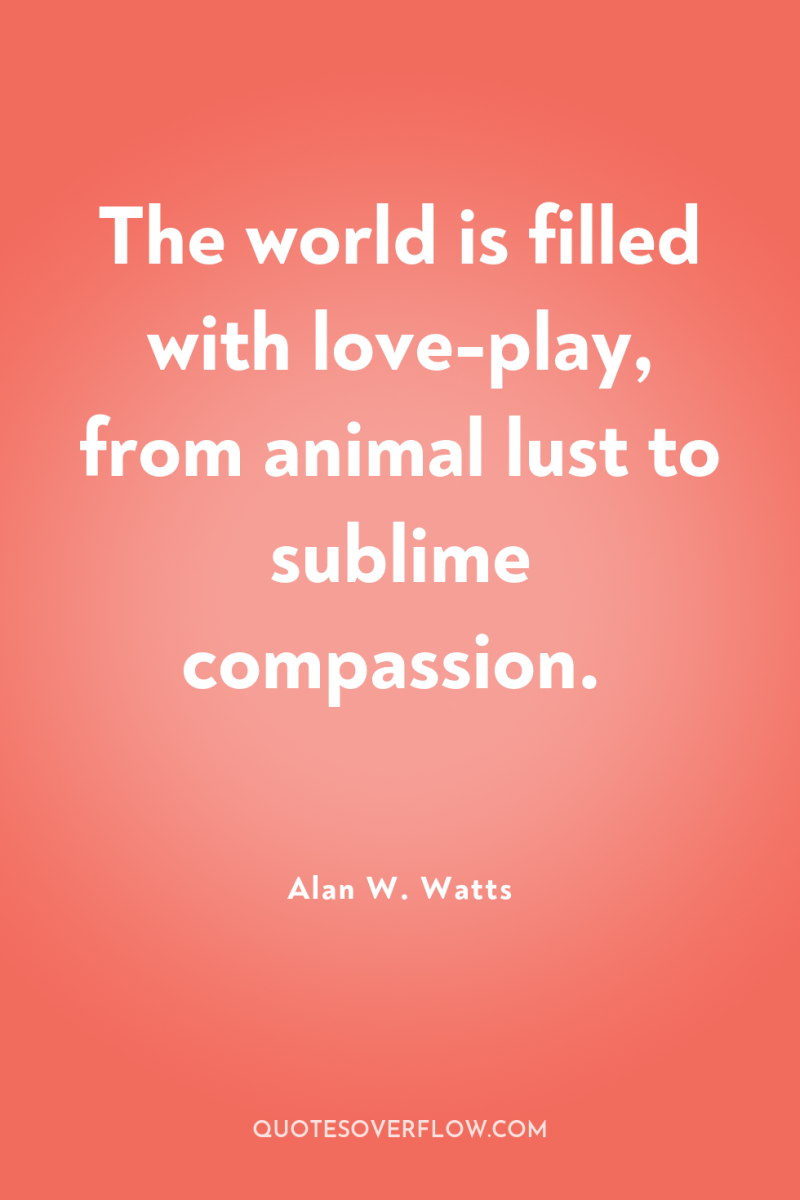
1
The world is filled with love-play, from animal lust to sublime compassion.Alan W. Watts
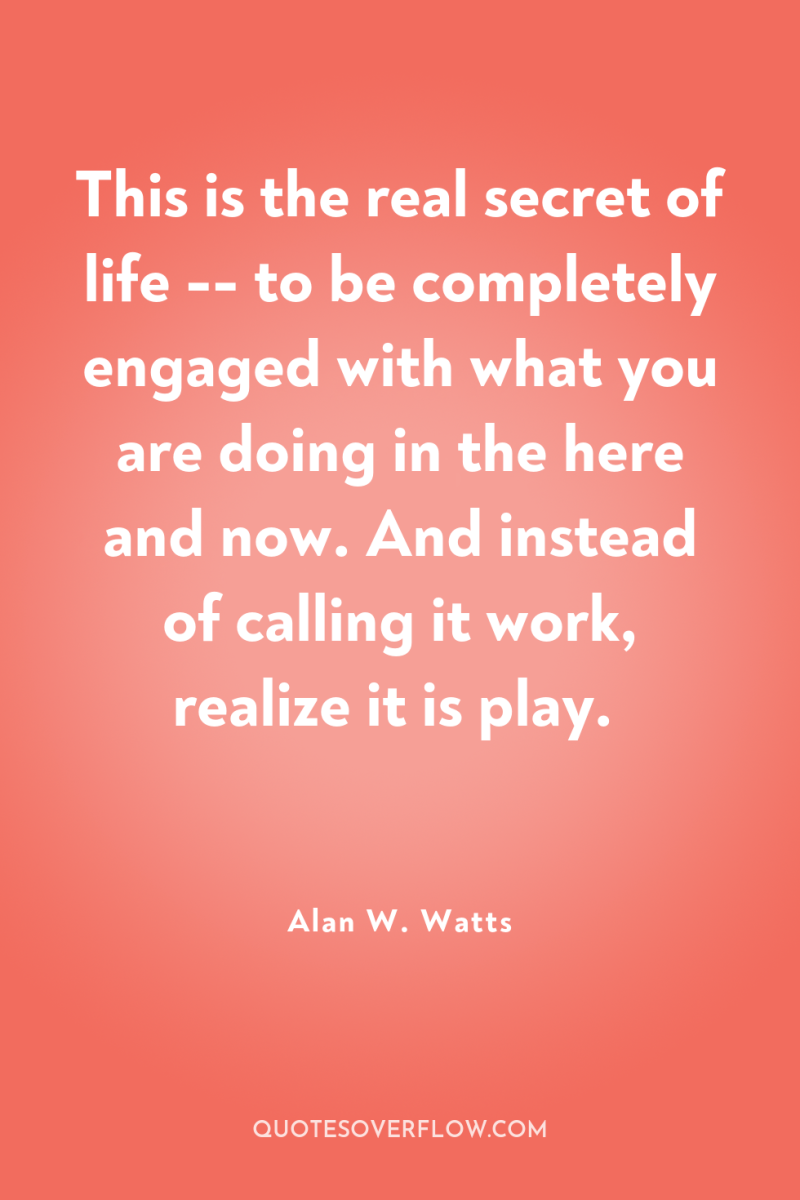
2
This is the real secret of life -- to be completely engaged with what you are doing in the here and now. And instead of calling it work, realize it is play.Alan W. Watts
3
The art of living... is neither careless drifting on the one hand nor fearful clinging to the past on the other. It consists in being sensitive to each moment, in regarding it as utterly new and unique, in having the mind open and wholly receptive.Alan W. Watts
4
If you say that getting the money is the most important thing, you'll spend your life completely wasting your time. You'll be doing things you don't like doing in order to go on living, that is to go on doing thing you don't like doing, which is stupid.Alan W. Watts
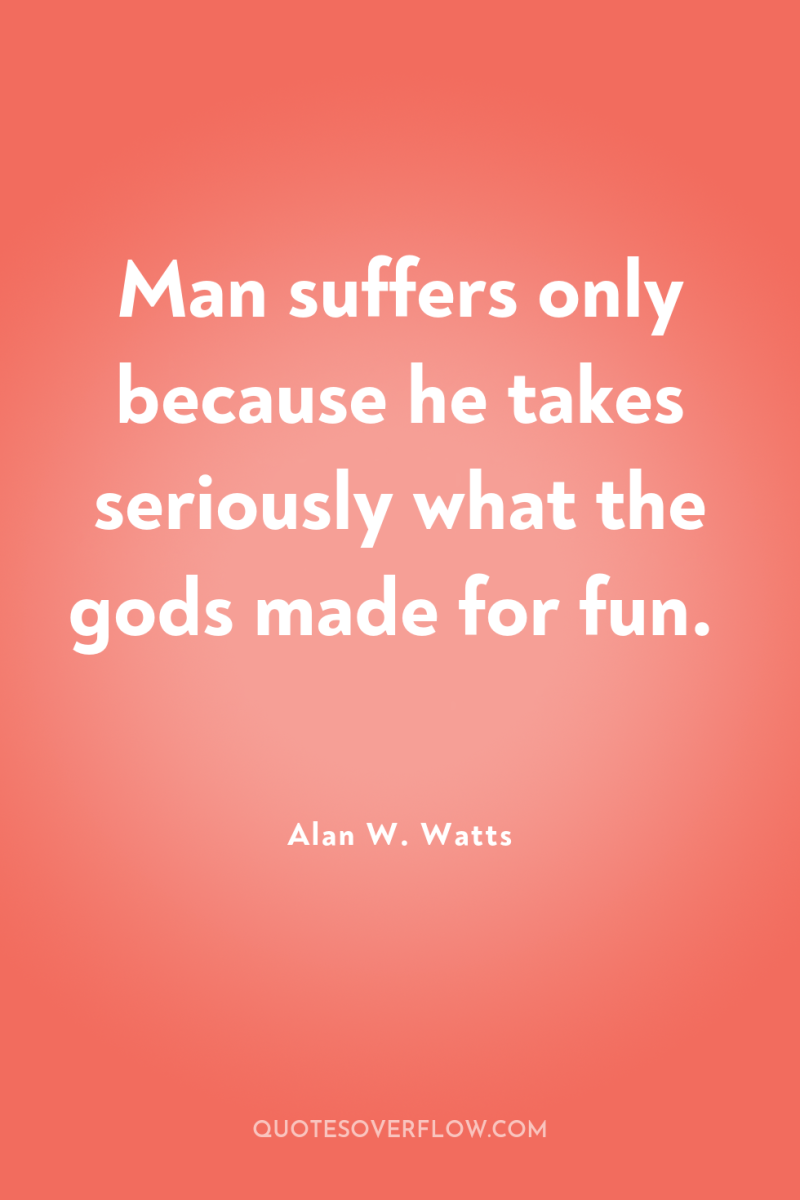
5
Man suffers only because he takes seriously what the gods made for fun.Alan W. Watts
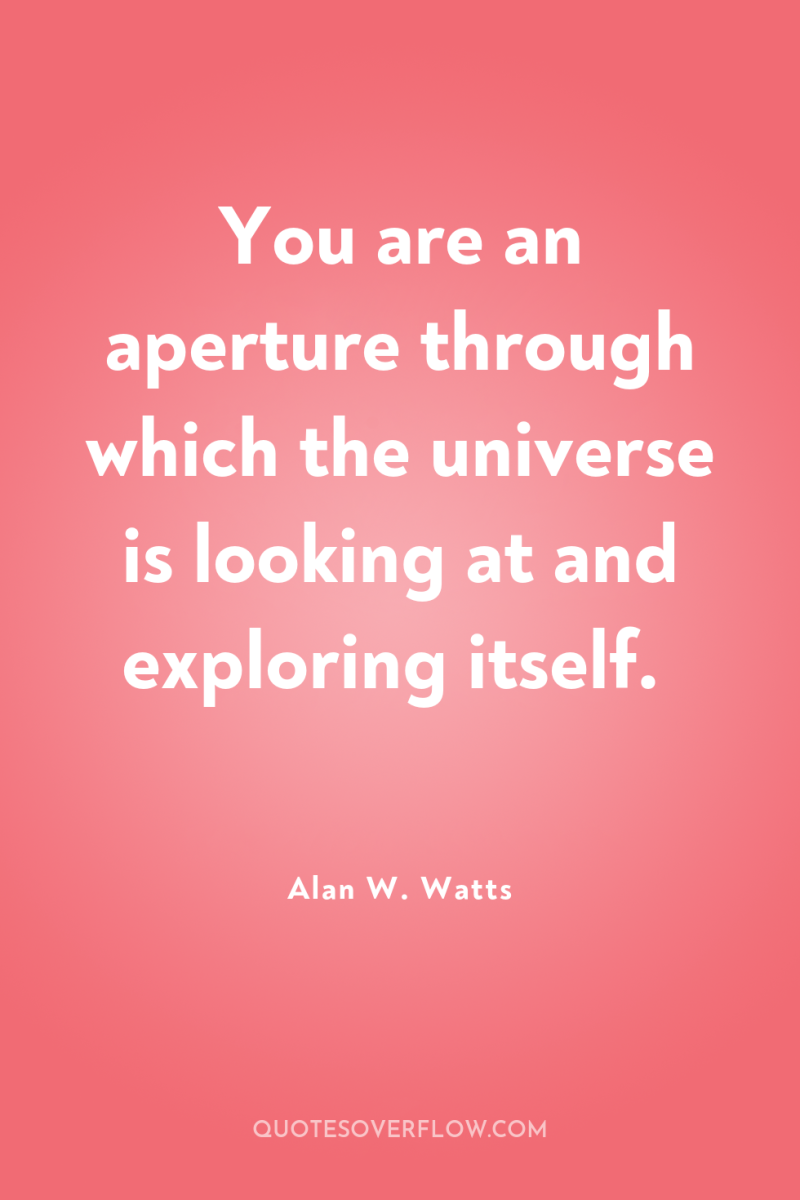
6
You are an aperture through which the universe is looking at and exploring itself.Alan W. Watts

7
The menu is not the meal.Alan W. Watts
8
Problems that remain persistently insoluble should always be suspected as questions asked in the wrong way.Alan W. Watts
9
What we have forgotten is that thoughts and words are conventions, and that it is fatal to take conventions too seriously. A convention is a social convenience, as, for example, money ... but it is absurd to take money too seriously, to confuse it with real wealth ... In somewhat the same way, thoughts, ideas and words are "coins" for real things.Alan W. Watts
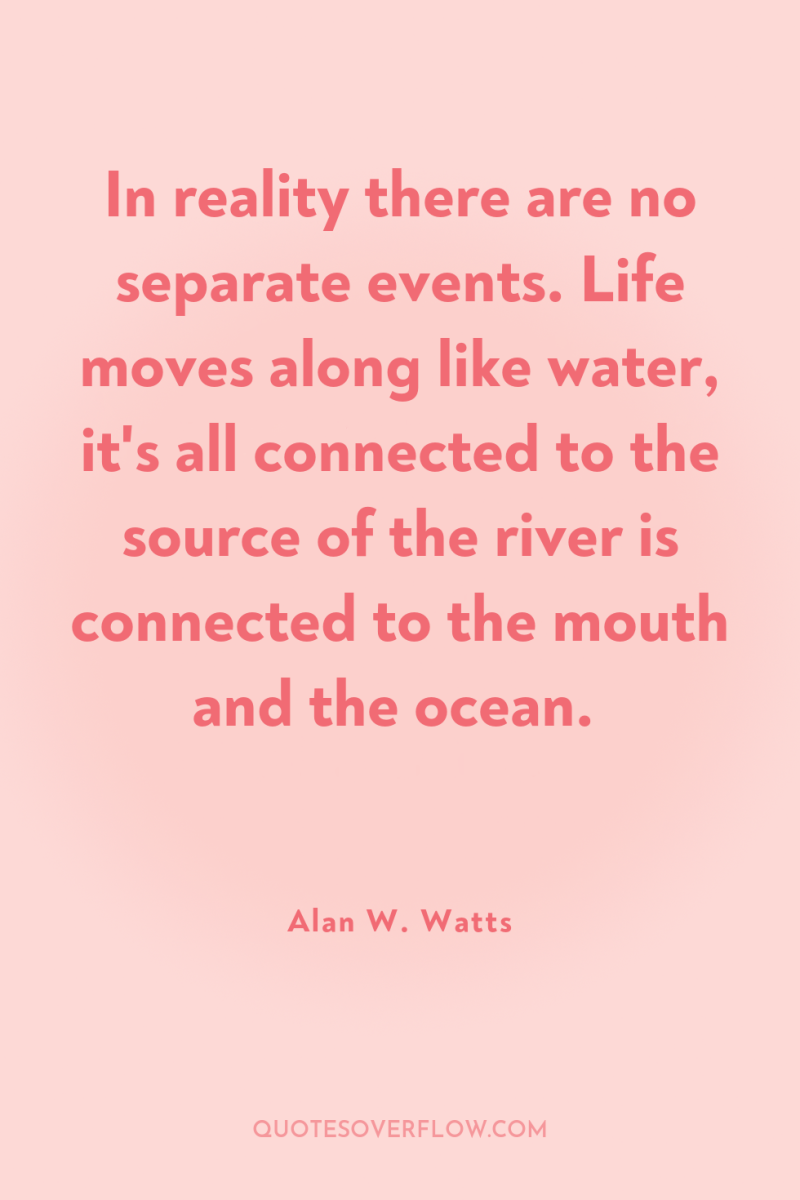
10
In reality there are no separate events. Life moves along like water, it's all connected to the source of the river is connected to the mouth and the ocean.Alan W. Watts
11
When somebody plays music, you listen. you just follow those sounds, and eventually you understand the music. the point can't be explained in words because music is not words, but after listening for a while, you understand the point of it, and that point is the music itself. in exactly the same way, you can listen to all experiences.Alan W. Watts
12
But spontaneity is not by any means a blind, disorderly urge, a mere power of caprice. A philosophy restricted to the alternatives of conventional language has no way of conceiving an intelligence which does not work according to plan, according to a one-at-a-time order of thought. Yet the concrete evidence of such an intelligence is right to hand in our own thoughtlessly ordered bodies. For the Tao does not 'know' how it produces the universe just as we do not 'know' how we construct our brains. .Alan W. Watts

13
Make a spurious division of one process into two, forget that you have done it, and then puzzle for centuries as to how the two get together.Alan W. Watts
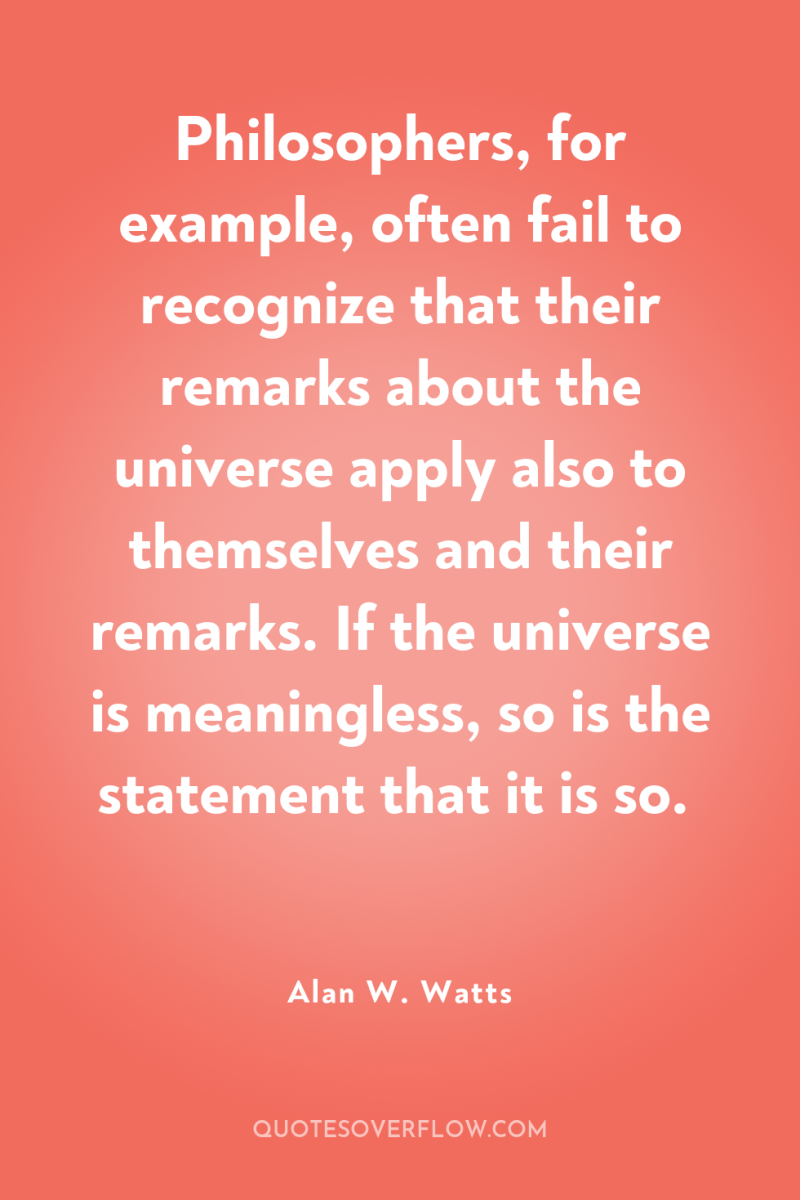
14
Philosophers, for example, often fail to recognize that their remarks about the universe apply also to themselves and their remarks. If the universe is meaningless, so is the statement that it is so.Alan W. Watts
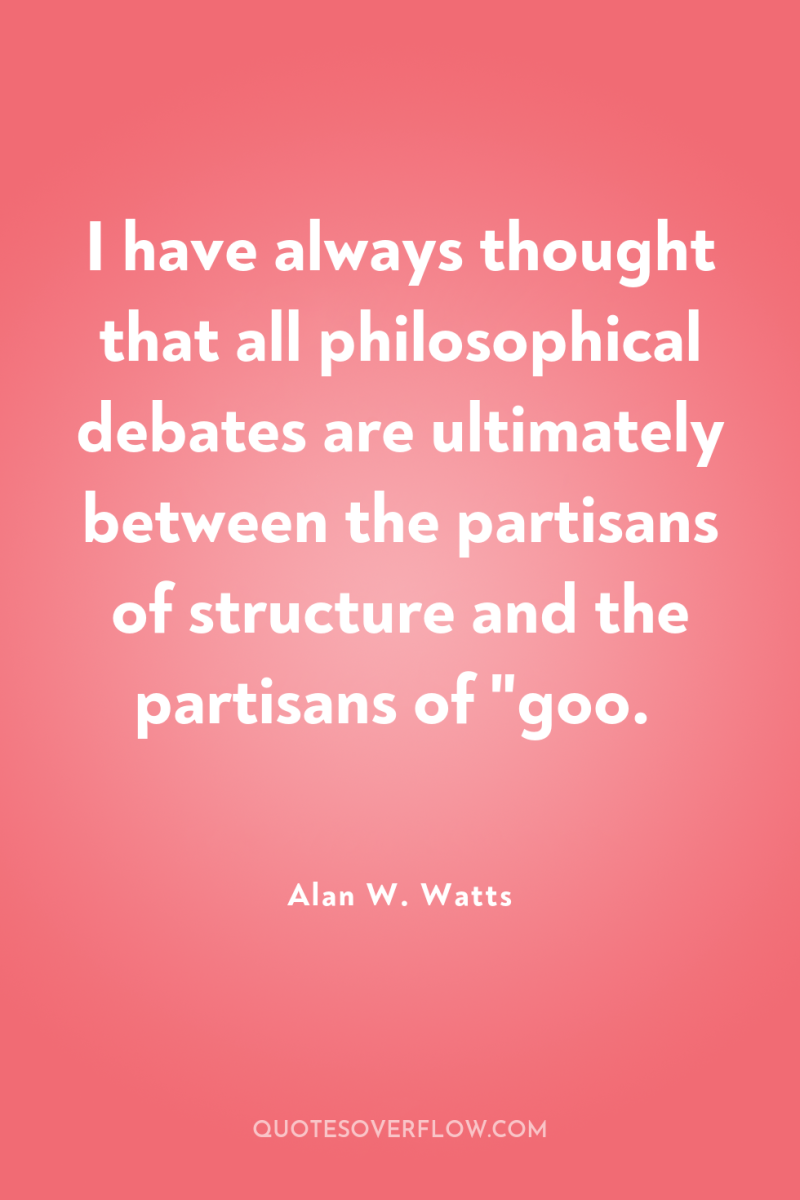
15
I have always thought that all philosophical debates are ultimately between the partisans of structure and the partisans of "goo.Alan W. Watts
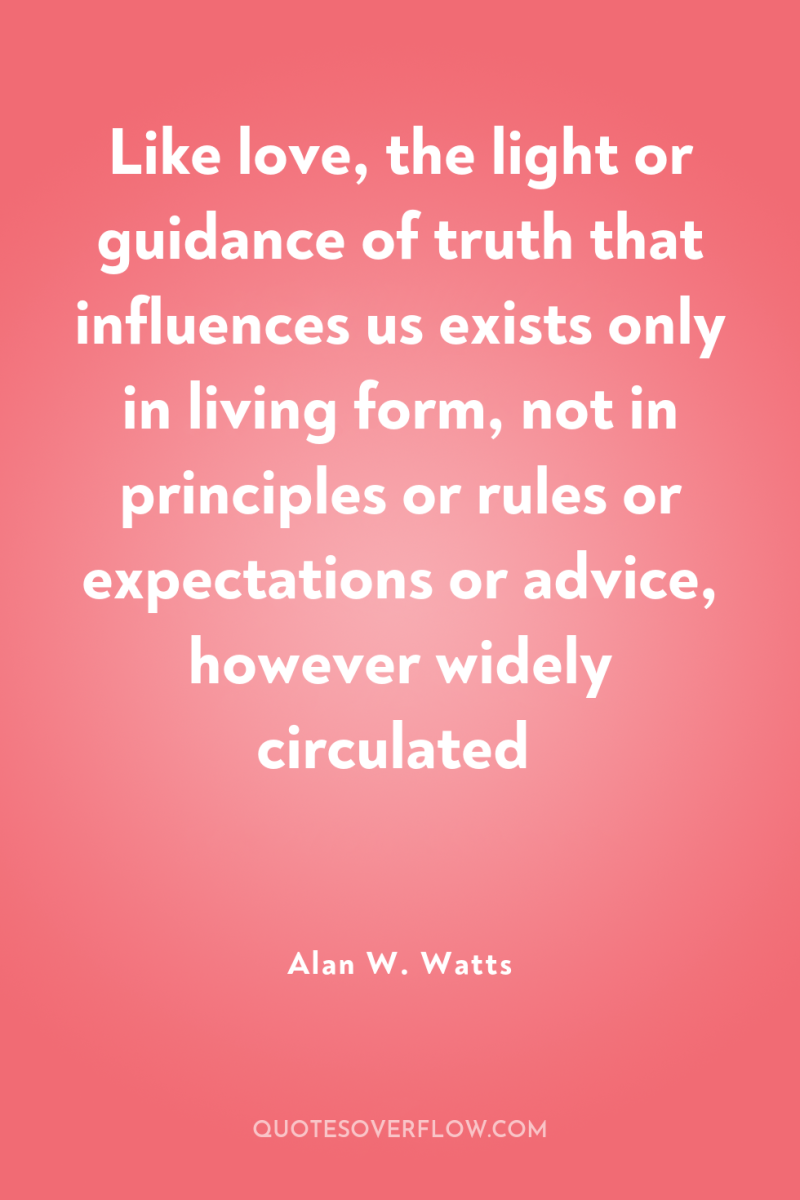
16
Like love, the light or guidance of truth that influences us exists only in living form, not in principles or rules or expectations or advice, however widely circulatedAlan W. Watts
17
Jesus Christ knew he was God. So wake up and find out eventually who you really are. In our culture, of course, they’ll say you’re crazy and you’re blasphemous, and they’ll either put you in jail or in a nut house (which is pretty much the same thing). However if you wake up in India and tell your friends and relations, ‘My goodness, I’ve just discovered that I’m God, ’ they’ll laugh and say, ‘Oh, congratulations, at last you found out. .Alan W. Watts
18
It is interesting that Hindus, when they speak of the creation of the universe do not call it the work of God, they call it the play of God, the Vishnu lila, lila meaning play. And they look upon the whole manifestation of all the universes as a play, as a sport, as a kind of dance – lila perhaps being somewhat related to our word liltAlan W. Watts
19
We seldom realize, for example that our most private thoughts and emotions are not actually our own. For we think in terms of languages and images which we did not invent, but which were given to us by our society.Alan W. Watts
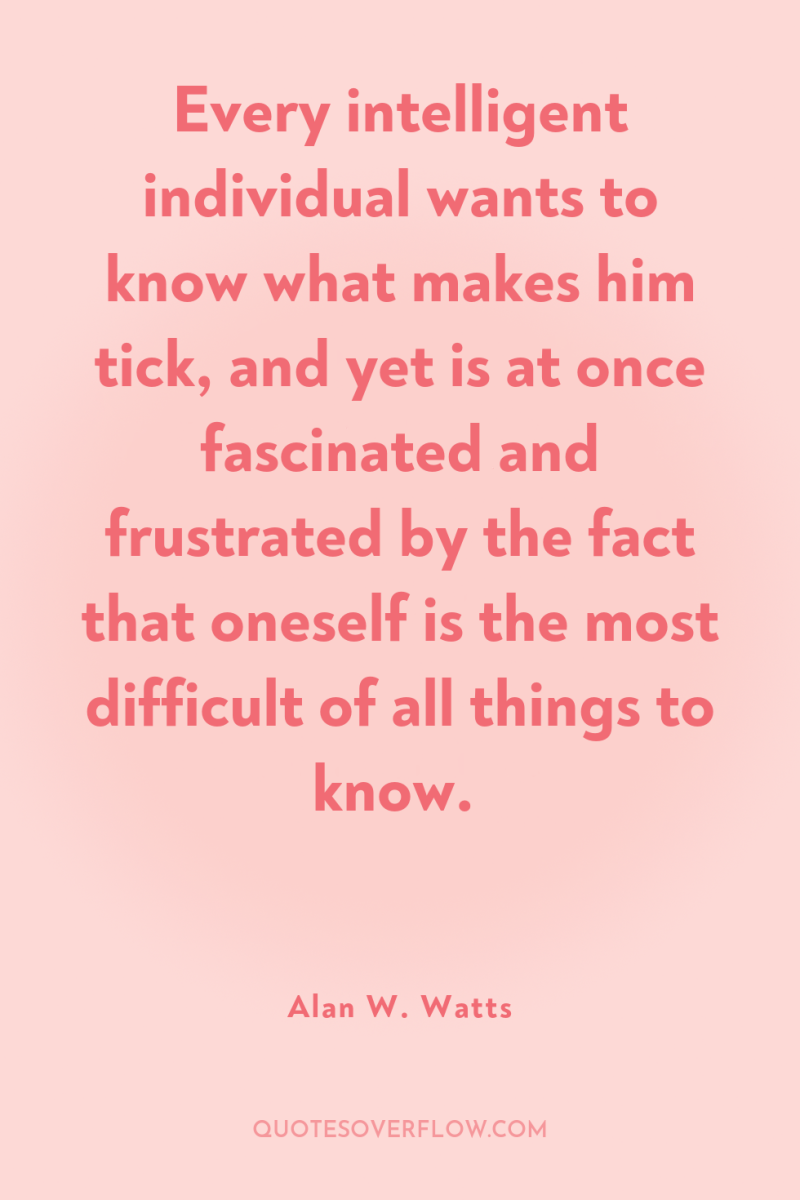
20
Every intelligent individual wants to know what makes him tick, and yet is at once fascinated and frustrated by the fact that oneself is the most difficult of all things to know.Alan W. Watts
21
Suppressing the fear of death makes it all the stronger. The point is only to know, beyond any shadow of doubt, that "I" and all other "things" now present will vanish, until this knowledge compels you to release them - to know it now as surely as if you had just fallen off the rim of the Grand Canyon. Indeed you were kicked off the edge of a precipice when you were born, and it's no help to cling to the rocks falling with you. If you are afraid of death, be afraid. The point is to get with it, to let it take over - fear, ghosts, pains, transience, dissolution, and all. And then comes the hitherto unbelievable surprise; you don't die because you were never born. You had just forgotten who you are. .Alan W. Watts
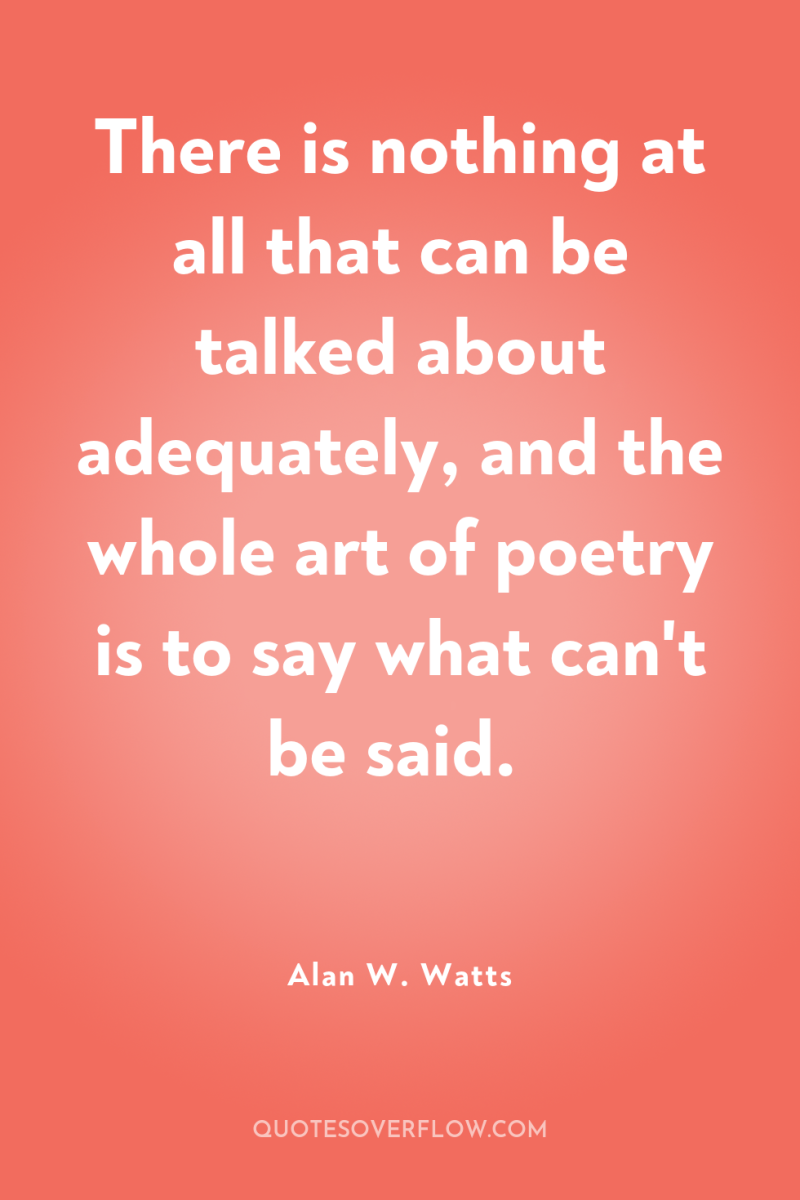
22
There is nothing at all that can be talked about adequately, and the whole art of poetry is to say what can't be said.Alan W. Watts

23
To have faith is to trust yourself to the water. When you swim you don't grab hold of the water, because if you do you will sink and drown. Instead you relax, and float.Alan W. Watts
24
A priest once quoted to me the Roman saying that a religion is dead when the priests laugh at each other across the altar. I always laugh at the altar, be it Christian, Hindu, or Buddhist, because real religion is the transformation of anxiety into laughter.Alan W. Watts
25
Advice? I don’t have advice. Stop aspiring and start writing. If you’re writing, you’re a writer. Write like you’re a goddamn death row inmate and the governor is out of the country and there’s no chance for a pardon. Write like you’re clinging to the edge of a cliff, white knuckles, on your last breath, and you’ve got just one last thing to say, like you’re a bird flying over us and you can see everything, and please, for God’s sake, tell us something that will save us from ourselves. Take a deep breath and tell us your deepest, darkest secret, so we can wipe our brow and know that we’re not alone. Write like you have a message from the king. Or don’t. Who knows, maybe you’re one of the lucky ones who doesn’t have to.Alan W. Watts
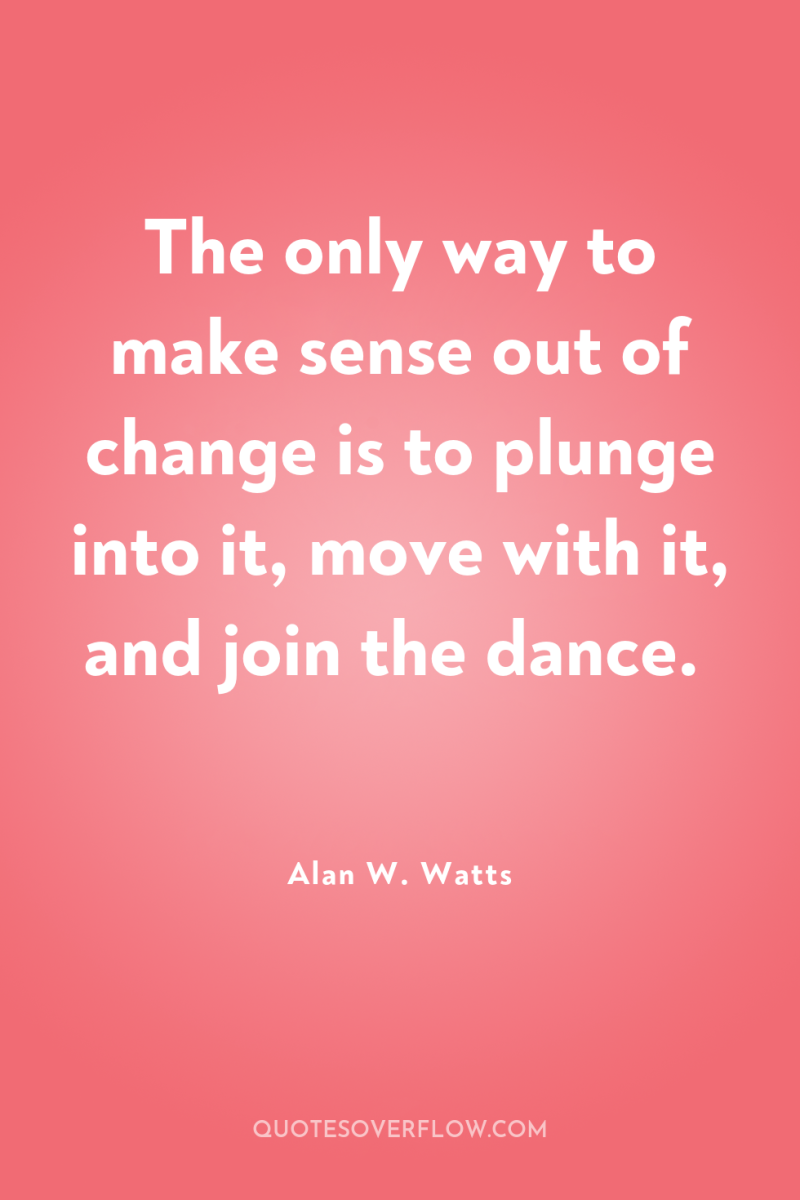
26
The only way to make sense out of change is to plunge into it, move with it, and join the dance.Alan W. Watts

27
Jesus was not the man he was as a result of making Jesus Christ his personal savior.Alan W. Watts

28
Muddy water is best cleared by leaving it alone.Alan W. Watts
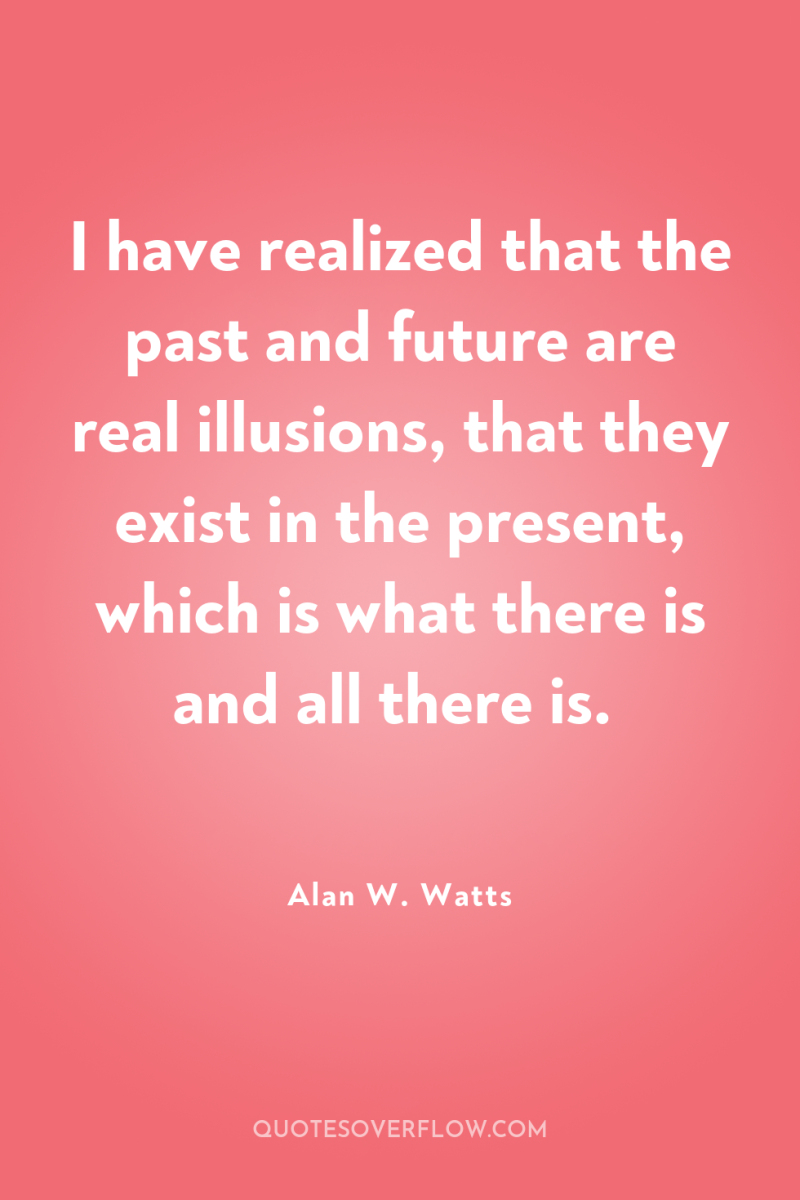
29
I have realized that the past and future are real illusions, that they exist in the present, which is what there is and all there is.Alan W. Watts
30
We are living in a culture entirely hypnotized by the illusion of time, in which the so-called present moment is felt as nothing but an infintesimal hairline between an all-powerfully causative past and an absorbingly important future. We have no present. Our consciousness is almost completely preoccupied with memory and expectation. We do not realize that there never was, is, nor will be any other experience than present experience. We are therefore out of touch with reality. We confuse the world as talked about, described, and measured with the world which actually is. We are sick with a fascination for the useful tools of names and numbers, of symbols, signs, conceptions and ideas. .Alan W. Watts
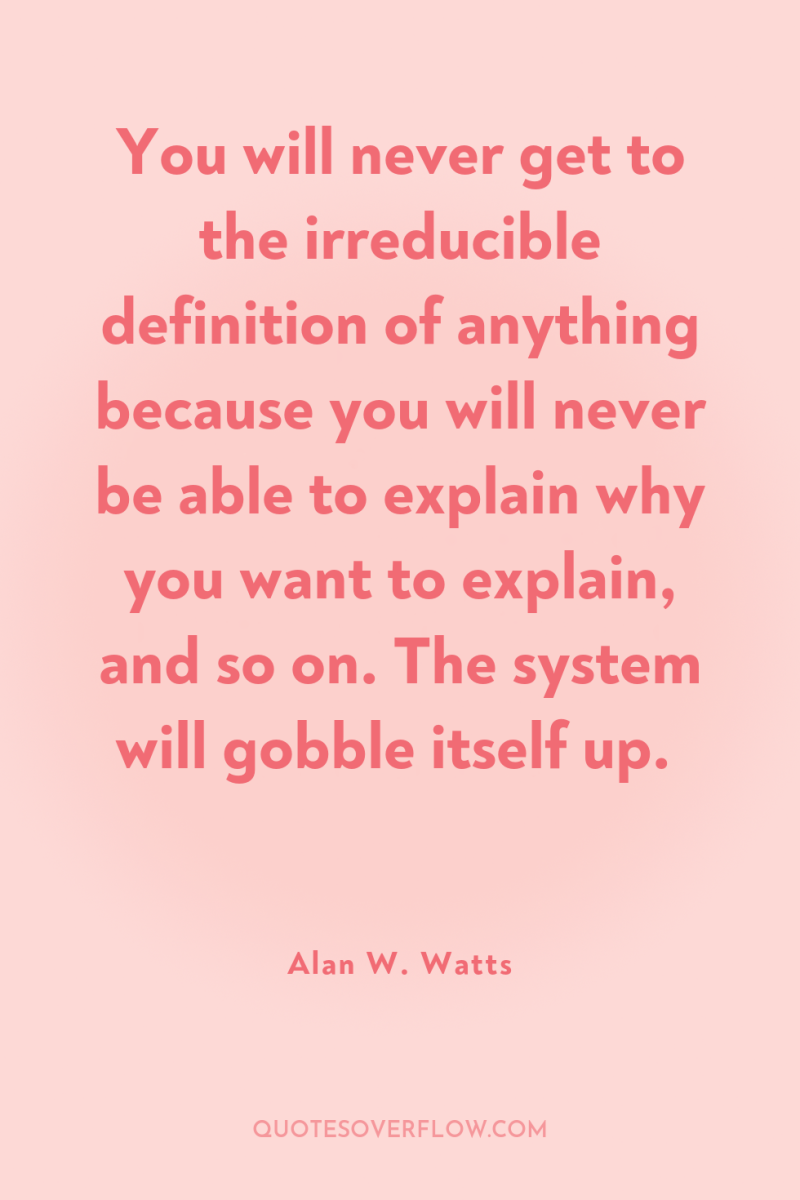
31
You will never get to the irreducible definition of anything because you will never be able to explain why you want to explain, and so on. The system will gobble itself up.Alan W. Watts
32
Thought and science are therefore raising problems which their terms of study can never answer, many of which are doubtless problems only for thought. The trisection of an angle is similarly an insoluble problem only for compass and straight-edge construction, and Achilles cannot overtake the tortoise so long as their progress is considered piecemeal, endlessly having the distance between them. However, as it is not Achilles but the method of measurement which fails to catch up with the tortoise, so it is not man but his method of thought which fails to find fulfillment in experience.Alan W. Watts
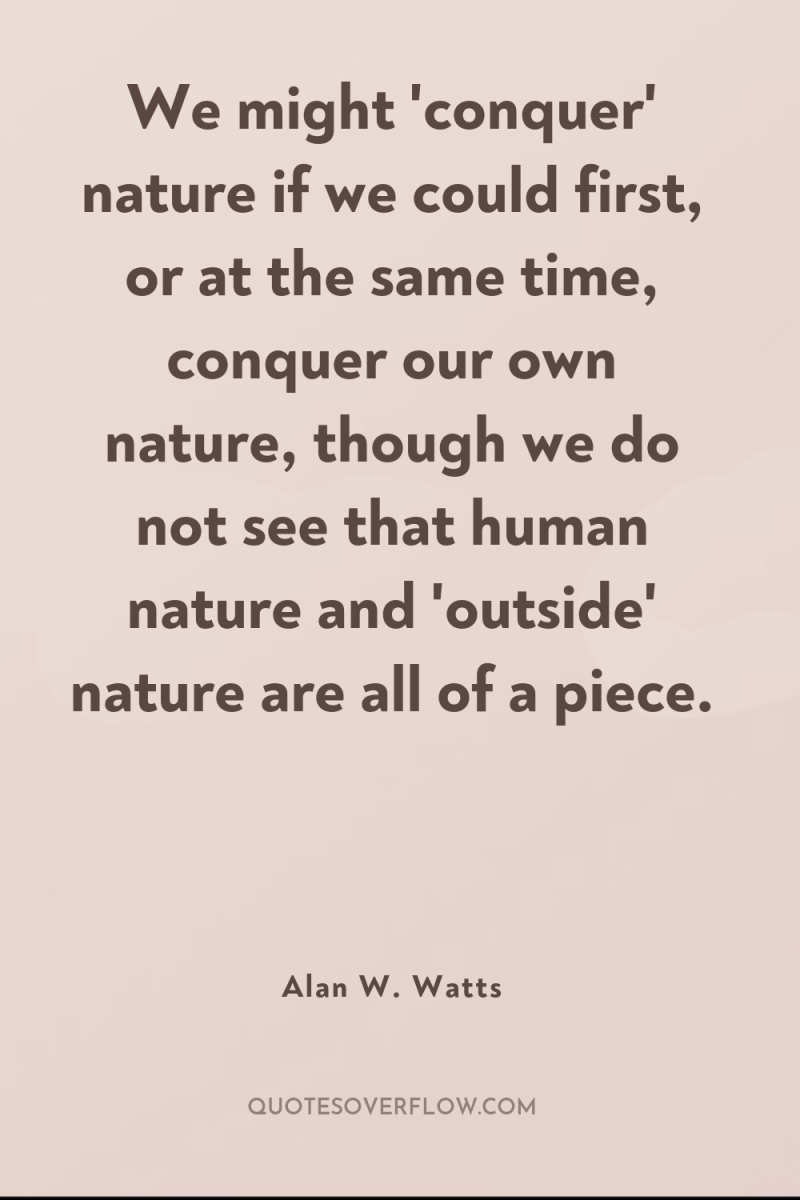
33
We might 'conquer' nature if we could first, or at the same time, conquer our own nature, though we do not see that human nature and 'outside' nature are all of a piece.Alan W. Watts
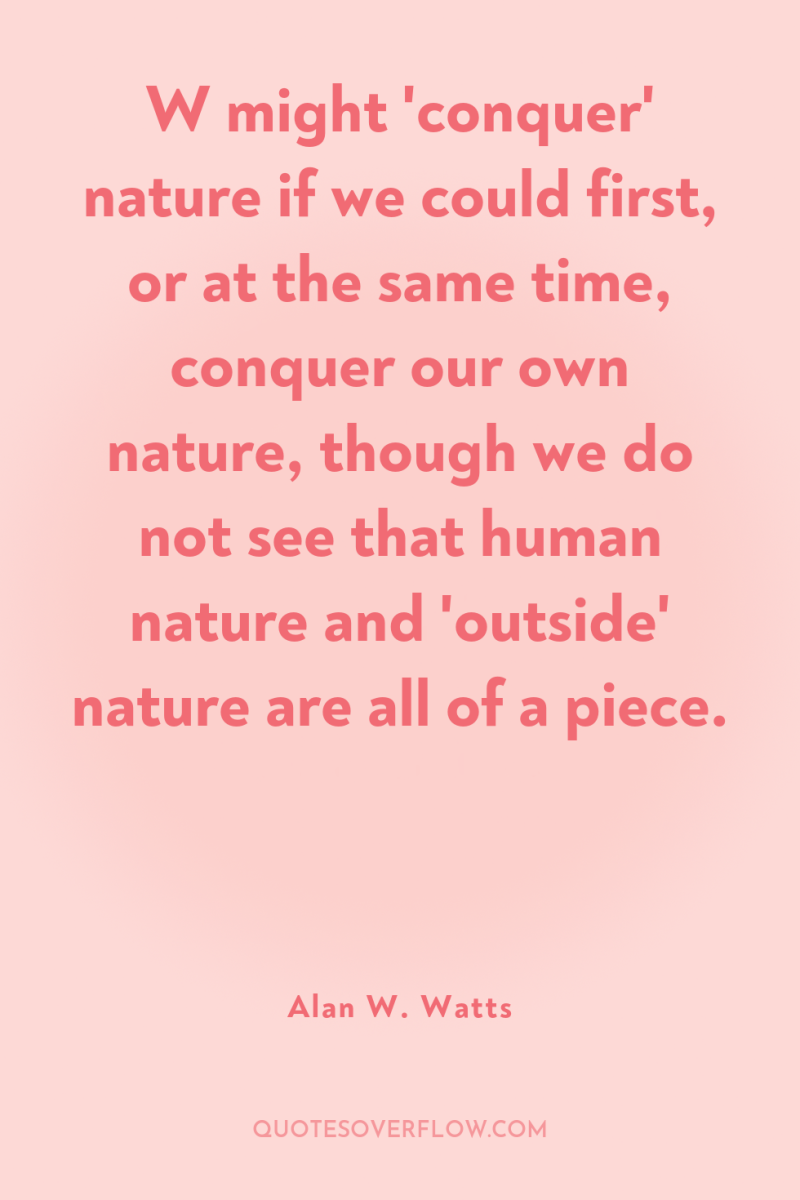
34
W might 'conquer' nature if we could first, or at the same time, conquer our own nature, though we do not see that human nature and 'outside' nature are all of a piece.Alan W. Watts
35
God is the Self of the world, but you can't see God for the same reason that, without a mirror, you can't see your own eyes, and you certainly can't bite your own teeth or look inside your head. Your self is that cleverly hidden because it is God hiding.Alan W. Watts
36
Suppressing the fear of death makes it all the stronger. The point is only to know, beyond any shadow of doubt, that "I" and all other "things" now present will vanish, until this knowledge compels you to release them - to know it now as surely as if you had just fallen off the rim of the Grand Canyon. Indeed you were kicked off the edge of a precipice when you were born, and it's no help to cling to the rocks falling with you. If you are afraid of death, be afraid. The point is to get with it, to let it take over - fear, ghosts, pains, transience, dissolution, and all.Alan W. Watts
37
Since opposed principles, or ideologies, are irreconcilable, wars fought over principle will be wars of mutual annihilation. But wars fought for simple greed will be far less destructive, because the aggressor will be careful not to destroy what he is fighting to capture. Reasonable - that is, human - men will always be capable of compromise, but men who have dehumanized themselves by becoming the blind worshipers of an idea or an ideal are fanatics whose devotion to abstractions makes them the enemies of life.Alan W. Watts
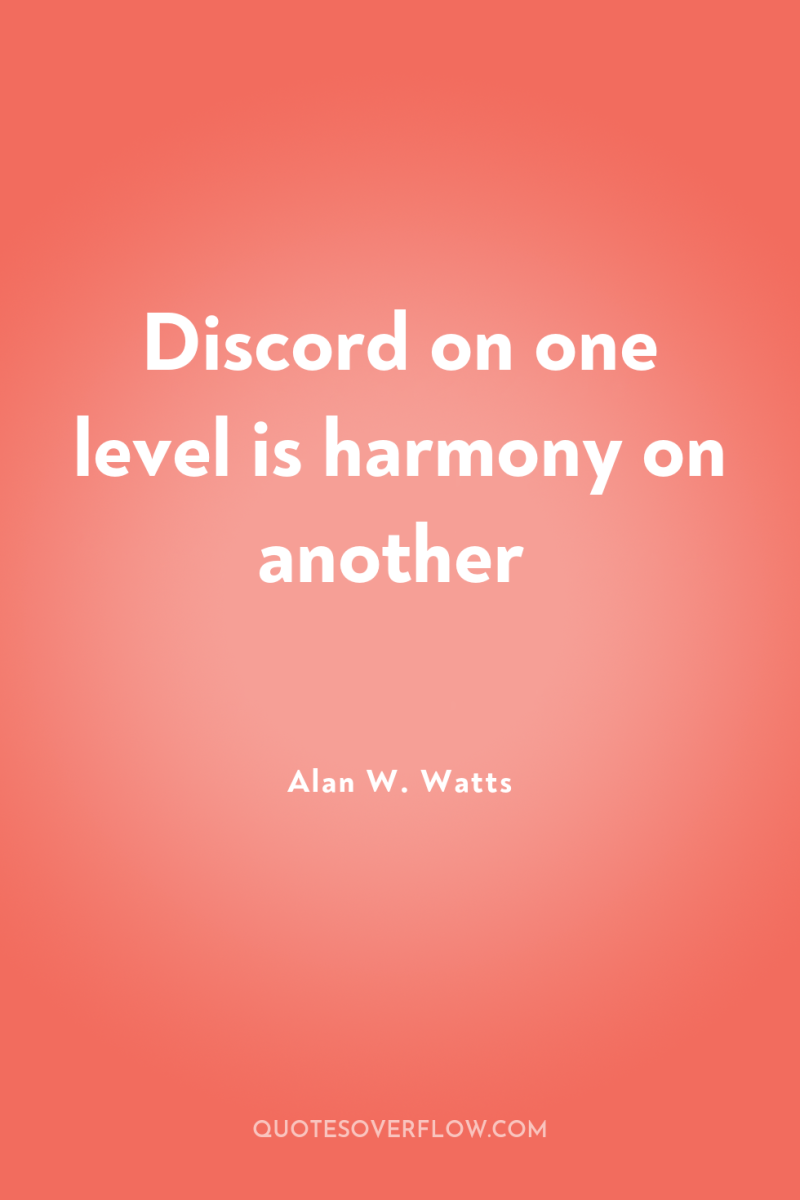
38
Discord on one level is harmony on anotherAlan W. Watts
39
Not long ago Congress voted, with much patriotic rhetoric, for the imposition of severe penalties upon anyone presuming to burn the flag of the United States. Yet the very Congressmen who passed this law are responsible, by acts of commission or omission, for burning, polluting, and plundering the territory that the flag is supposed to represent. Therein, they exemplified the peculiar andperhaps fatal fallacy of civilization: the confusion of symbol with reality.Alan W. Watts
40
People become concerned with being more humble than other people.Alan W. Watts
41
Naturally, for a person who finds his identity in something other than his full organism is less than half a man. He is cut off from complete participation in nature. Instead of being a body, he 'has' a body. Instead of living and loving he 'has' instincts for survival and copulation.Alan W. Watts
42
When it comes down to it, government is simply an abandonment of responsibility on the assumption that there are people, other than ourselves, who really know how to manage things. But the government, run ostensibly for the good of the people, becomes a self-serving corporation. To keep things under control it proliferates laws of ever-increasing complexity and unintelligibility, and hinders productive work by demanding so much accounting on paper that the record of what has been done becomes more important than what has actually been done. The Taoist moral is that people who mistrust themselves and one another are doomed. .Alan W. Watts
43
Money alone cannot buy pleasure, though it can help. For enjoyment is an art and a skill for which we have little talent or energy.Alan W. Watts
44
Normally, we do not so much look at things as overlook them.Alan W. Watts
45
In looking out upon the world, we forget that the world is looking at itself.Alan W. Watts
46
It is hard indeed to notice anything for which the languages available to us have no description.Alan W. Watts
47
The art of meditation is a way of getting into touch with reality, and the reason for it is that most civilized people are out of touch with reality because they confuse the world as it with the world as they think about it and talk about it and describe it. For on the one hand there is the real world and on the other there is a whole system of symbols about that world which we have in our minds. These are very very useful symbols, all civilization depends on them, but like all good things they have their disadvantages, and the principle disadvantage of symbols is that we confuse them with reality, just as we confuse money with actual wealth.Alan W. Watts
48
Zen is a liberation from time. For if we open our eyes and see clearly, it becomes obvious that there is no other time than this instant, and that the past and the future are abstractions without any concrete reality.Alan W. Watts
49
We seldom realize, for example, that our most private thoughts and emotions are not actually our own. For we think in terms of languages and images which we did not invent, but which were given to us by our society. We copy emotional reactions from our parents, learning from them thatexcrement is supposed to have a disgusting smell and that vomiting is supposed to be an unpleasant sensation. The dread of death is also learned from their anxieties about sickness and from their attitudes to funerals and corpses. Our social environment has this power just because we do not exist apart from a society. Society is our extended mind and body. Yet the very society from which the individual is inseparable is using its whole irresistible force to persuade the individual that he is indeed separate! Society as we now know it is therefore playing a game with self-contradictory rules. .Alan W. Watts
50
One is a great deal less anxious if one feels perfectly free to be anxious, and the same may be said of guilt.Alan W. Watts
51
In a relativistic universe you don't cling to anything, you learn to swim. And you know what swimming is - it's kind of a relaxed attitude with the water. In which you don't keep yourself afloat by holding the water, but by a certain giving to it.Alan W. Watts
52
No work or love will flourish out of guilt, fear, or hollowness of heart, just as no valid plans for the future can be made by those who have no capacity for living now.Alan W. Watts
53
Faith is a state of openness or trust. To have faith is like when you trust yourself to the water. You don’t grab hold of the water when you swim, because if you do you will become stiff and tight in the water, and sink. You have to relax, and the attitude of faith is the very opposite of clinging, and holding on. In other words, a person who is fanatic in matters of religion, and clings to certain ideas about the nature of God and the universe becomes a person who has no faith at all. Instead they are holding tight. But the attitude of faith is to let go, and become open to truth, whatever it might turn out to be. .Alan W. Watts
54
When you find out that there was never anything in the dark side to be afraid of … Nothing is left but to love.Alan W. Watts
55
The source of all light is in the eye.Alan W. Watts
56
If you cannot trust yourself, you cannot even trust your mistrust of yourself - so that without this underlying trust in the whole system of nature you are simply paralyzedAlan W. Watts
57
To travel is to be alive, but to get somewhere is to be dead.Alan W. Watts
58
We suffer from a hallucination, from a false and distorted sensation of our own existence as living organisms. Most of us have the sensation that "I myself" is a separate center of feeling and action, living inside and bounded by the physical body–a center which "confronts" an "external" world of people and things, making contact through the senses with a universe both alien and strange. Everyday figures of speech reflect this illusion. "I came into this world." "You must face reality." "The conquest of nature." This feeling of being lonely and very temporary visitors in the universe is in flat contradiction to everything known about man (and all other living organisms) in the sciences. We do not "come into" this world; we come out of it, as leaves from a tree. As the ocean "waves, " the universe "peoples." Every individual is an expression of the whole realm of nature, a unique action of the total universe. This fact is rarely, if ever, experienced by most individuals. Even those who know it to be true in theory do not sense or feel it, but continue to be aware of themselves as isolated "egos" inside bags of skin.Alan W. Watts
59
You are a function of what the whole universe is doing in the same way that a wave is a function of what the whole ocean is doing.Alan W. Watts
60
Through our eyes, the universe is perceiving itself. Through our ears, the universe is listening to its harmonies. We are the witnesses through which the universe becomes conscious of its glory, of its magnificence.Alan W. Watts
61
Other people teach us who we are. Their attitudes to us are the mirror in which we learn to see ourselves, but the mirror is distorted. We are, perhaps, rather dimly aware of the immense power of our social enviornment.Alan W. Watts
62
So then, the relationship of self to other is the complete realization that loving yourself is impossible without loving everything defined as other than yourself.Alan W. Watts
63
Like too much alcohol, self-consciousness makes us see ourselves double, and we make the double image for two selves - mental and material, controlling and controlled, reflective and spontaneous. Thus instead of suffering we suffer about suffering, and suffer about suffering about suffering.Alan W. Watts
64
And if I forget how many times I have been here, and in how many shapes, this forgetting is the necessary interval of darkness between every pulsation of light. I return in every baby born.Alan W. Watts
65
As is so often the way, what we have suppressed and overlooked issomething startlingly obvious. The difficulty is that it is so obvious andbasic that one can hardly find the words for it. The Germans call it a Hintergedanke, an apprehension lying tacitly in the back of our mindswhich we cannot easily admit, even to ourselves. The sensation of "I" asa lonely and isolated center of being is so powerful andcommonsensical, and so fundamental to our modes of speech andthought, to our laws and social institutions, that we cannot experienceselfhood except as something superficial in the scheme of the universe. Iseem to be a brief light that flashes but once in all the aeons of time–arare, complicated, and all-too-delicate organism on the fringe ofbiological evolution, where the wave of life bursts into individual, sparkling, and multicolored drops that gleam for a moment only tovanish forever. Under such conditioning it seems impossible and evenabsurd to realize that myself does not reside in the drop alone, but in thewhole surge of energy which ranges from the galaxies to the nuclearfields in my body. At this level of existence "I" am immeasurably old;my forms are infinite and their comings and goings are simply thepulses or vibrations of a single and eternal flow of energy. .Alan W. Watts
66
If you awaken from this illusion and you understand that black implies white, self implies other, life implies death (or shall I say death implies life?), you can feel yourself — not as a stranger in the world, not as something here unprobational, not as something that has arrived here by fluke - but you can begin to feel your own existence as absolutely fundamental.Alan W. Watts
67
And people get all fouled up because they want the world to have meaning as if it were words... As if you had a meaning, as if you were a mere word, as if you were something that could be looked up in a dictionary. You are meaning.Alan W. Watts
68
We must abandon completely the notion of blaming the past for any kind of situation we're in and reverse our thinking and see that the past always flows back form the present. That now is the creative point of life. So you see its like the idea of forgiving somebody, you change the meaning of the past by doing that.. Also watch the flow of music. The melody as its expressed is changed by notes that come later. Just as the meaning of a sentence..you wait till later to find out what the sentence means.. The present is always changing the past. .Alan W. Watts
69
The answer to the problem of suffering is not away from the problem but in it. The inevitability of pain will not be met by deadening sensitivity but by increasing it, by exploring and feeling out the manner in which the natural organism itself wants to react and which its innate wisdom has provided.Alan W. Watts
70
Camus said there is only really one serious philosophical question, which is whether or not to commit suicide. I think there are four or five serious philosophical questions: The first one is: Who started it? The second is: Are we going to make it? The third is: Where are we going to put it? The fourth is: Who's going to clean up? And the fifth: Is it serious? Out Of Your Mind (2004), Audio lecture 1: The Nature of Consciousness: A Game That's Worth The Candle.Alan W. Watts
71
We fail so easily to see the difference between fear of the unknown and respect for the unknown, thinking that those who do not hasten in with bright lights and knives are deterred by a holy and superstitious fear. Respect for the unknown is the attitude of those who, instead of raping nature, woo her until she gives herself. But what she gives, even then, is not the cold clarity of the surface but the warm inwardness of the body - a mysteriousness which is not merely a negation, a blank absence of knowledge, but that positive substance which we call wonderfull.Alan W. Watts
72
For our radically misnamed “materialistic” civilization must above all cultivate the love of material, of earth, air, and water, of mountains and forests, of excellent food and imaginative housing and clothing, and of cherishing our artfully erotic contacts between human bodies. Certainly, all these so—called “things” are as impermanent as ripples in water, but what life, what love, what energy is there in a perfectly pure abstraction or a totally solid and eternally indestructible rock? .Alan W. Watts
73
There was a young man who said though, it seems that I know that I know, but what I would like to see is the I that knows me when I know that I know that I know.Alan W. Watts
74
To notice is to select, toregard some bits of perception, or some features of the world, as morenoteworthy, more significant, than others. To these we attend, and therest we ignore–for which reason conscious attention is at the same time ignorance despite the fact that it gives us a vividlyclear picture of whatever we choose to notice.Alan W. Watts
75
To look at life without words is not to lose the ability to form words- to think, remember, and plan. To be silent is not to lose your tongue. On the contrary, it is only through silence that one can discover something new to talk about. One who talked incessantly, without stopping to look and listen, would repeat himself ad nauseam. It is the same with thinking, which is really silent talking. It is not, by itself, open to the discovery of anything new, for its only novelties are simply arrangements of old words and ideas.Alan W. Watts
76
You and I are all as much continuous with the physical universe as a wave is continuous with the ocean.Alan W. Watts
77
Technology is destructive only in the hands of people who do not realize that they are one and the same process as the universe.Alan W. Watts
78
The hostile attitude of conquering nature ignores the basic interdependence of all things and events - that the world beyond the skins is actually an extension of our own bodies - and will end in destroying the very environment form which we emerge and upon which our whole life dependsAlan W. Watts
79
It is fundamental to both Taoist and Confucian thought that the natural man is to be trusted, and from their standpoint it appears that the Western mistrust of human nature-whether theological or technological-is a kind of schizophrenia. It would be impossible, in their view, to believe oneself innately evil without discrediting the very belief, since all the notions of a perverted mind would be perverted notions.Alan W. Watts
80
[T]he greater part of human activity is designed to make permanent those experiences and joys which are only lovable because they are changing. Music is a delight because of its rhythm and flow. Yet the moment you arrest the flow and prolong a chord or note beyond its time, the rhythm is destroyed. Because life is a flowing process, change and death are its necessary parts. To work for their exclusion is to work against life.Alan W. Watts
81
The difference between having a job and having a vocation is that a job is some unpleasant work you do in order to make money, with the sole purpose of making money. There are plenty of jobs because there is still a certain amount of dirty work that nobody wants to do, and that therefore they will pay someone to do it. There is essentially less and less of that kind of work because of mechanization. If you do a job with the sole purpose of making money, you are absurd, because if money becomes the goal—and it does if you work that way—you begin increasingly to confuse it with happiness or with pleasure. Yes, one can take a handful of crisp one dollar bills and practically water your mouth over it, but this is a kind of person who is confused like a Pavlov dog, who salivates on the wrong bell.Alan W. Watts
82
The difference between having a job and having a vocation is that a job is some unpleasant work you do in order to make money, with the sole purpose of making money. There are plenty of jobs because there is still a certain amount of dirty work that nobody wants to do, and that therefore they will pay someone to do it. There is essentially less and less of that kind of work because of mechanisation. If you do a job with the sole purpose of making money, you are absurd, because if money becomes the goal—and it does if you work that way—you begin increasingly to confuse it with happiness or with pleasure. Yes, one can take a handful of crisp one dollar bills and practically water your mouth over it, but this is a kind of person who is confused like a Pavlov dog, who salivates on the wrong bell.Alan W. Watts
83
Life and love generate effort, but effort will not generate them.Alan W. Watts
84
In the strictest sense, we cannot actually think about life and reality at all, because this would have to include thinking about thinking, thinking about thinking about thinking, and so ad infinitum. One can only attempt a rational, descriptive philosophy of the universe on the assumption that one is totally separate from it. But if you and your thoughts are part of this universe, you cannot stand outside them to describe them.Alan W. Watts
85
To "know" reality you cannot stand outside it and define it; you must enter into it, be it, and feel it.Alan W. Watts
86
Working rightly, the brain is the highest form of "instinctual wisdom." Thus it should work like the homing instinct of pigeons and the formation of the foetus in the womb - without verbalizing the process of knowing "how" it does it. The self-conscious brain, like the self-conscious heart, is a disorder, and manifests itself in the acute feeling of separation between "I" and my experience.Alan W. Watts
87
I owe my solitude to other people.Alan W. Watts
88
Here's an example: someone says, "Master, please hand me the knife, " and he hands them the knife, blade first. "Please give me the other end, " he says. And the master replies, "What would you do with the other end?" This is answering an everyday matter in terms of the metaphysical. When the question is, "Master, what is the fundamental principle of Buddhism?" Then he replies, "There is enough breeze in this fan to keep me cool." That is answering the metaphysical in terms of the everyday, and that is, more or less, the principle zen works on. The mundane and the sacred are one and the same.Alan W. Watts
89
If we get rid of all wishful thinking and dubious metaphysical speculations, we can hardly doubt that — at a time not too distant — each one of us will simply cease to be. It won’t be like going into darkness forever, for there will be neither darkness, nor time, nor sense of futility, nor anyone to feel anything about it. Try as best you can to imagine this, and keep at it. The universe will, supposedly, be going on as usual, but for each individual it will be as if it had never happened at all; and even that is saying too much, because there won’t be anyone for whom it never happened. Make this prospect as real as possible: the one total certainty. You will be as if you had never existed, which was, however, the way you were before you did exist — and not only you but everything else. Nevertheless, with such an improbable past, here we are. We begin from nothing and end in nothing. You can say that again. Think it over and over, trying to conceive the fact of coming to never having existed. After a while you will begin to feel rather weird, as if this very apparent something that you are is at the same time nothing at all. Indeed, you seem to be rather firmly and certainly grounded in nothingness, much as your sight seems to emerge from that total blankness behind your eyes. The weird feeling goes with the fact that you are being introduced to a new common sense, a new logic, in which you are beginning to realize the identity of ku and shiki, void and form. All of a sudden it will strike you that this nothingness is the most potent, magical, basic, and reliable thing you ever thought of, and that the reason you can’t form the slight idea of it is that it’s yourself. But not the self you thought you were.Alan W. Watts
90
Problems that remain persistently insoluble should always be suspected as questions asked in the wrong wayAlan W. Watts
91
For eternally and always there is only now, one and the same now; the present is the only thing that has no end.Alan W. Watts
92
The realm of liberation is absolutely incommensurable with the relativities of higher and lower, better and worse, gain and loss, since these are all disadvantages of the ego.Alan W. Watts
93
Here is the vicious circle: if you feel separate from your organic life, you feel driven to survive; survival -going on living- thus becomes a duty and also a drag because you are not fully with it; because it does not quite come up to expectations, you continue to hope that it will, to crave for more time, to feel driven all the more to go on.Alan W. Watts
94
For there is no joy in continuity, in the perpetual. We desire it only because the present is empty. A person who is trying to eat money is always hungry. When someone says, "Time to stop now! " he is in a panic because he has had nothing to eat yet, and wants more and more time to go on eating money, ever hopeful of satisfaction around the corner. We do not really want continuity, but rather a present experience of total happiness. The thought of wanting such an experience to go on and on is a result of being self-conscious in the experience, and thus incompletely aware of it. So long as there is the feeling of an "I" having this experience, the moment is not all. Eternal life is realized when the last trace of difference between "I" and "now" has vanished - when there is just this "now" and nothing else. By contrast, hell or "everlasting damnation" is not the everlastingness of time going on forever, but of the unbroken circle, the continuity and frustration of going round and round in pursuit of something which can never be attained. Hell is the fatuity, the everlasting impossibility, of self-love, self-consciousness, and seld-possession. It is trying to see one´s own eyes, hear one´s own ears, and kiss one´s own lips.Alan W. Watts
95
For there is no joy in continuity, in the perpetual. We desire it only because the present is empty. A person who is trying to eat money is always hungry. When someone says, "Time to stop now! " he is in a panic because he has had nothing to eat yet, and wants more and more time to go on eating money, ever hopeful of satisfaction around the corner. We do not really want continuity, but rather a present experience of total happiness. The though of wanting such an experience to go on and on is a result of being self-conscious in the experience, and thsu incompletely aware of it. So long as there is the feeling of an "I" having this experience, the moment is not all. Eternal life is realized when the last trace of difference between "I" and "now" has vanished - when there is just this "now" and nothing else. By contrast, hell or "everlasting damnation" is not the everlastingness of time going on forever, but of the unbroken circle, the continuity and frustration of going round and round in pursuit of something which can never be attained. Hell is the fatuity, the everlasting impossibility, of self-love, self-consciousness, and seld-possession. It is trying to see one´s own eyes, hear one´s own ears, and kiss one´s own lips.Alan W. Watts
96
For there is no joy in continuity, in the perpetual. We desire it only because the present is empty. A person who is trying to eat money is always hungry. When someone says, "Time to stop now! " he is in a panic because he has had nothing to eat yet, and wants more and more time to go on eating money, ever hopeful of satisfaction around the corner. We do not really want continuity, but rather a present experience of total happiness. The thought of wanting such an experience to go on and on is a result of being self-conscious in the experience, and thus incompletely aware of it. So long as there is the feeling of an "I" having this experience, the moment is not all. Eternal life is realized when the last trace of difference between "I" and "now" has vanished - when there is just this "now" and nothing else. By contrast, hell or "everlasting damnation" is not the everlastingness of time going on forever, but of the unbroken circle, the continuity and frustration of going round and round in pursuit of something which can never be attained. Hell is the fatuity, the everlasting impossibility, of self-love, self-consciousness, and self-possession. It is trying to see one´s own eyes, hear one´s own ears, and kiss one´s own lips.Alan W. Watts
97
Our pleasures are not material pleasures, but symbols of pleasure — attractively packaged but inferior in content.Alan W. Watts
98
The common mistake of the religious celibate has been to suppose that the highest spiritual life absolutely demands the renunciation of sexuality, as if the knowledge of God were an alternative to the knowledge of woman, or to any other form of experience.Alan W. Watts
99
It's like you took a bottle of ink and you threw it at a wall. Smash! And all that ink spread. And in the middle, it's dense, isn't it? And as it gets out on the edge, the little droplets get finer and finer and make more complicated patterns, see? So in the same way, there was a big bang at the beginning of things and it spread. And you and I, sitting here in this room, as complicated human beings, are way, way out on the fringe of that bang. We are the complicated little patterns on the end of it. Very interesting. But so we define ourselves as being only that. If you think that you are only inside your skin, you define yourself as one very complicated little curlique, way out on the edge of that explosion. Way out in space, and way out in time. Billions of years ago, you were a big bang, but now you're a complicated human being. And then we cut ourselves off, and don't feel that we're still the big bang. But you are. Depends how you define yourself. You are actually--if this is the way things started, if there was a big bang in the beginning-- you're not something that's a result of the big bang. You're not something that is a sort of puppet on the end of the process. You are still the process. You are the big bang, the original force of the universe, coming on as whoever you are. When I meet you, I see not just what you define yourself as-- Mr so-and- so, Ms so-and-so, Mrs so-and-so-- I see every one of you as the primordial energy of the universe coming on at me in this particular way. I know I'm that, too. But we've learned to define ourselves as separate from it.Alan W. Watts
100
My conscious mind must have its roots and origins in the most unfathomable depths of being, yet it feels as if it lived all by itself in this tight little skull.Alan W. Watts